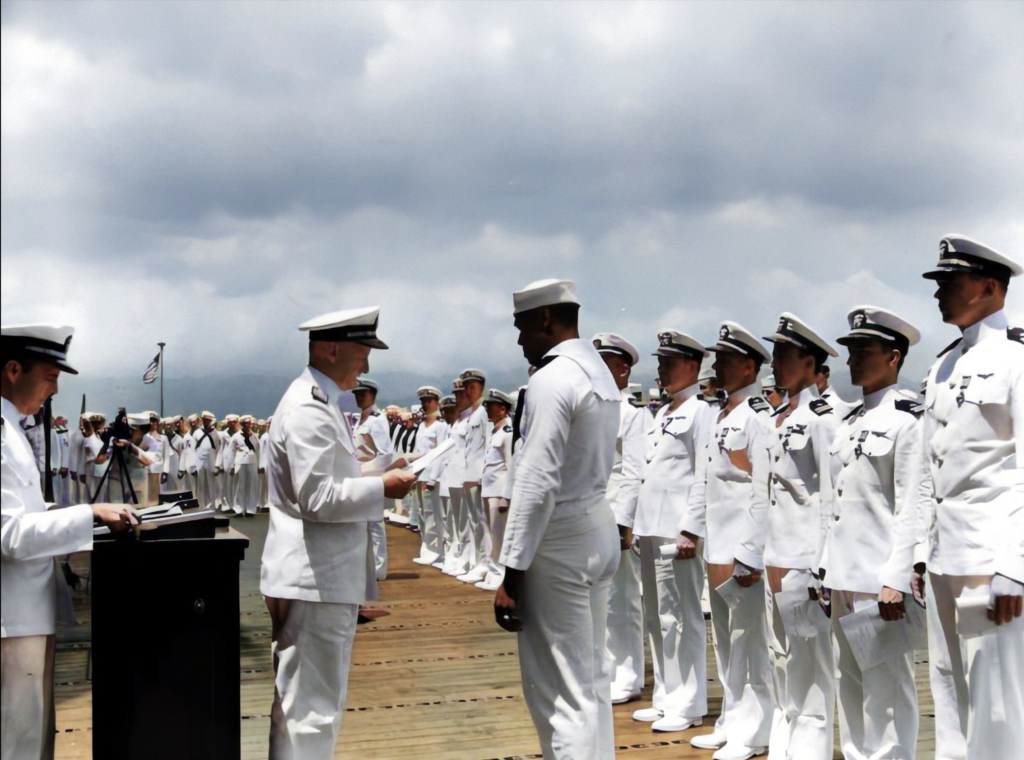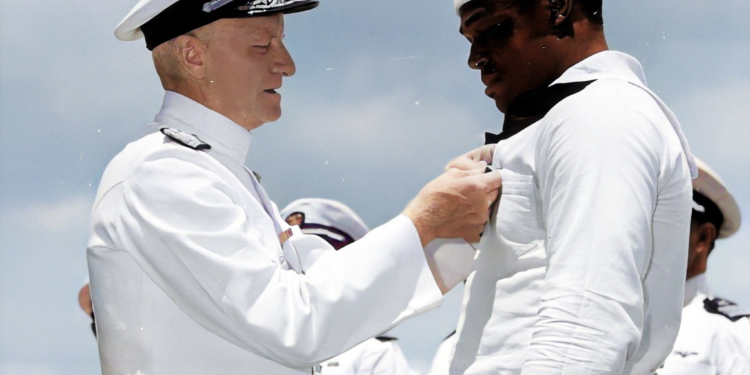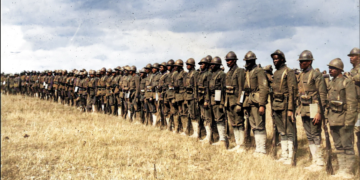July 5, 2025 Story by: Editor
Doris “Dorie” Miller was not just a cook in the U.S. Navy—he was a man who redefined courage and patriotism in a military still segregated by race. On December 7, 1941, during the surprise attack on Pearl Harbor, Miller acted far beyond the expectations of his assigned duties.
His valor that morning transformed him into a national symbol of African American heroism during World War II and reshaped how the military—and the country—viewed Black service members.
Pearl Harbor: A Moment of Heroism
Miller was serving as a Mess Attendant Third Class aboard the USS West Virginia, one of the many battleships moored at Battleship Row when Japanese bombers descended upon Pearl Harbor. As torpedoes and bombs tore through the ship, killing hundreds, Miller sprang into action.
Though not trained in combat arms and relegated by Navy policy to support roles due to his race, Miller assisted wounded sailors, including the ship’s mortally injured captain. Then, without formal gunnery training, he mounted an unattended .50 caliber anti-aircraft machine gun and began firing at incoming Japanese planes, reportedly downing several.
Miller manned the gun until he ran out of ammunition and was ordered to abandon ship. His courageous actions—under intense fire, without preparation or expectation—became one of the few bright spots on a day of immense tragedy.

Photo courtesy of: The Doris Miller Memorial
From Sailor to Symbol
Initially unnamed in press reports, Miller was later identified as the heroic sailor aboard the West Virginia. His bravery quickly captured the attention of Black newspapers and civil rights organizations, prompting widespread calls for recognition. In May 1942, Miller was awarded the Navy Cross, the third-highest Navy decoration for valor, presented personally by Admiral Chester Nimitz—marking the first time a Black sailor received such an honor.
This moment was both historic and transformative. At a time when the U.S. military remained deeply segregated, Miller’s recognition sparked national conversations about race, service, and the contributions of Black Americans to the war effort.
A Legacy That Grew in Death
Miller continued to serve after Pearl Harbor. In 1943, he was assigned to the escort carrier USS Liscome Bay, which was later struck by a Japanese torpedo during the Battle of Makin in the Gilbert Islands. Miller was among the 646 crew members killed when the ship sank. He was just 24 years old.
Even in death, Miller’s impact only expanded. He became a powerful icon of sacrifice and possibility. His legacy contributed to the momentum for President Truman’s 1948 executive order desegregating the U.S. armed forces, and later inspired decades of efforts to fully integrate the contributions of African Americans into the national military narrative.
Honoring the Man and the Mission
Today, Doris Miller is remembered not just for a single act of bravery, but for breaking the mold of who was expected to be a hero in World War II. Schools, Navy facilities, and memorials across the country bear his name. Most notably, in 2020, the U.S. Navy announced it would name a new aircraft carrier—the USS Doris Miller (CVN-81)—in his honor, the first such vessel ever named for an African American and for an enlisted sailor.
According to the National Museum of the Pacific War, Miller’s story reminds us that courage is not confined by rank, training, or circumstance—it is revealed in action. His unforeseen legacy has reshaped the military’s identity, inspiring future generations of Americans, regardless of race, to serve with honor.

Photo caption: Miller receives Navy Cross from Admiral Nimitz aboard the USS Enterprise. (Photo courtesy of: National Archives.)
Why Doris Miller Still Matters
Doris Miller’s name may not have been known on December 6, 1941—but by the end of the next day, he had become a hero whose actions helped redefine American values in war and in peace. His life continues to challenge historical silences and push institutions to recognize the full scope of sacrifice and service.
In remembering Doris Miller, we remember a moment when courage triumphed over injustice, and when one man’s bold decision helped change the course of history.
Source: Doris Miller Memorial / National Museum of the Pacific War

















